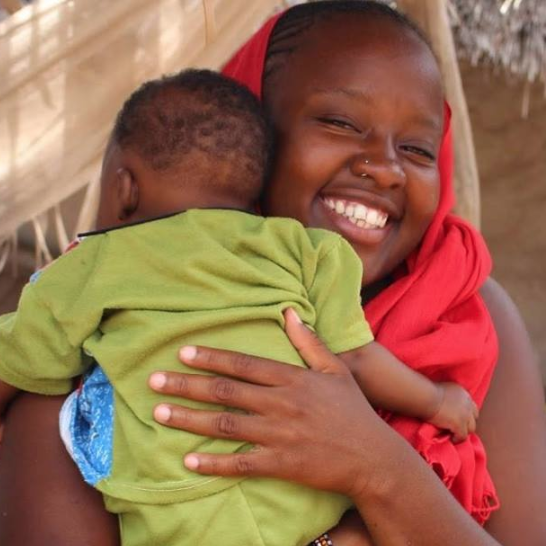News
Happy Accidents
April 23, 2020
April 23, 2020
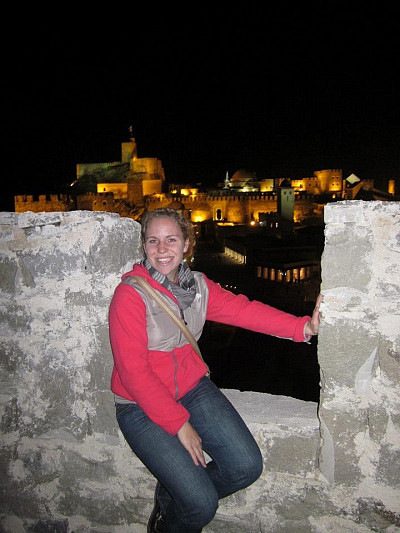
She landed in those fields “by accident,” she says. “So many things happened in my life that were by accident.”
Discovering a path
During her junior year in high school, Ellermann had signed up for AP Spanish “on a whim,” but it turned out to be a significant challenge because she was one of maybe two nonnative Spanish speakers in the class. But she relished that challenge, so at Southwestern, she decided to continue with the language, declaring it as her minor. Latin American Studies (now called Latin American and Border Studies) was the obvious complementary major because she was intrigued by the culture of Spanish-speaking countries as well.
Serendipity would take her across the equator as well. “I studied abroad by accident, too,” she laughs. She had no specific plan with her major, so when her academic advisor suggested that many of her fellow majors studied abroad, she consulted with the staff at the Office of Intercultural Learning. They suggested she consider Argentina given her courses of study. So Ellermann soon found herself immersed in Spanish and other classes in Buenos Aires.
The experience afforded the then-SU junior the opportunity to focus her studies on a particular field; Ellermann chose a human-rights track. She began a two-month internship with La Alameda, an antimafia nonprofit organization that fought slave labor, child exploitation, human and drug trafficking, and the illegal sex trade. “They would go on raids in sweatshops and brothels,” she recalls. “I didn’t do any of that, but I got a lot of exposure [to those issues] working with the organization.”
The internship inspired Ellermann to pursue postgraduate opportunities with similar human-rights nonprofits. However, such positions are difficult to land—“especially without a lot of experience,” she recalls. So Ellermann sought advice from SU’s career services, who recommended that she consult with a Peace Corps recruiter. Recognizing that volunteer service with the agency could provide her with further training and experience in the field, she began the long application process as soon as she graduated from Southwestern, working as a pharmacy tech to pay the bills during the next 15 months.
When she was accepted into the Peace Corps, Ellermann was assigned to serve as a teacher of English as a foreign language. Considering her interest in human rights, how did the SU alumna end up in a teaching position? “By accident!” is the now-familiar refrain. “I didn’t want to do education. I never wanted to teach, so that worked out well,” she laughs. She explains that during the early 2010s, the Peace Corps was coping with budget cuts, which meant that Ellermann’s departure had to be postponed a few times; consequently, her service assignments changed as well. Ultimately, her undergraduate work with the Georgetown Project, a youth-development organization, likely contributed to her Peace Corps assignment: she had tutored with different schools and taught Spanish through the organization’s Community Resource Center, earning her the requisite 30 hours that qualified her to teach with the Peace Corps.
It might not have been the plan, but, Ellermann says, “I was very, very excited just because I was so worried I wasn’t going to get anything. I was elated to have a path.” It would also turn out to be one of the best decisions of her life.
Volunteering in a more developed country
In the summer of 2012, Ellermann moved to Georgia, a former Soviet republic that straddles the border between Europe and Asia. She traveled to the country’s southwestern province of Samtskhe–Javakheti, alighting in Akhaltsikhe, the region’s capital and largest town, with a population hovering around 20,000 (give or take a few thousand depending on the year). Established in the Middle Ages on the north and south banks of the Potskhovi River, the town’s name means “new fortress,” referring to Rabati Castle, a ninth-century edifice that was sumptuously restored to boost tourism in the area just before Ellermann arrived.

Although Georgia is a mountainous country, Akhaltsikhe is situated in a valley, and hailing from Texas, the SU grad appreciated the area’s fairly mild climate: it snowed in the winter, but “very few places had A/C,” she recalls, because highs in the summer reached only 75 or 80 degrees. And among the countries the Peace Corps serves, Georgia is one of the more developed nations. Georgians living in rural areas might have had to collect water from wells, and some of her students used outdoor toilets, but they usually had electricity. Ellermann’s residence, meanwhile, boasted not just electricity but also running water, a water heater, a toilet, and a shower. So compared with the experiences of many other SU–Peace Corps alumni, “I was definitely not roughing it,” says Ellermann. “I got really lucky in terms of my living situation.”
The alumna’s living arrangements might not have posed many challenges, but learning to speak Georgian, a language that also has its own alphabet, did. “I had to learn how to read and write all over again,” she recalls. “I knew how to say, ‘My name is Kristin’ and ‘Is there hot water?’ And I couldn’t even say that right because my host family didn’t understand me!”
The host family Ellermann stayed with during her first 12 weeks in country were, as she describes them, “the kindest and most warmhearted people. They just welcomed me right into their family.” They might not have spoken English, and Ellermann might not have known more than three words of Georgian—at first. But eventually, after four-hour language lessons six days a week, the alumna was able to communicate, if haltingly. Her host mother would translate the conversation into what Ellermann playfully calls “Kristin Georgian—the 12 words that I could understand.” Her relationship with the family remains intact today, and it remains one of the highlights of her time in eastern Europe. She loves that she maintains a bond with her Georgian sister, who was 11 when Ellermann arrived and is now in college. “It’s just so cool to see her grow up,” she says.
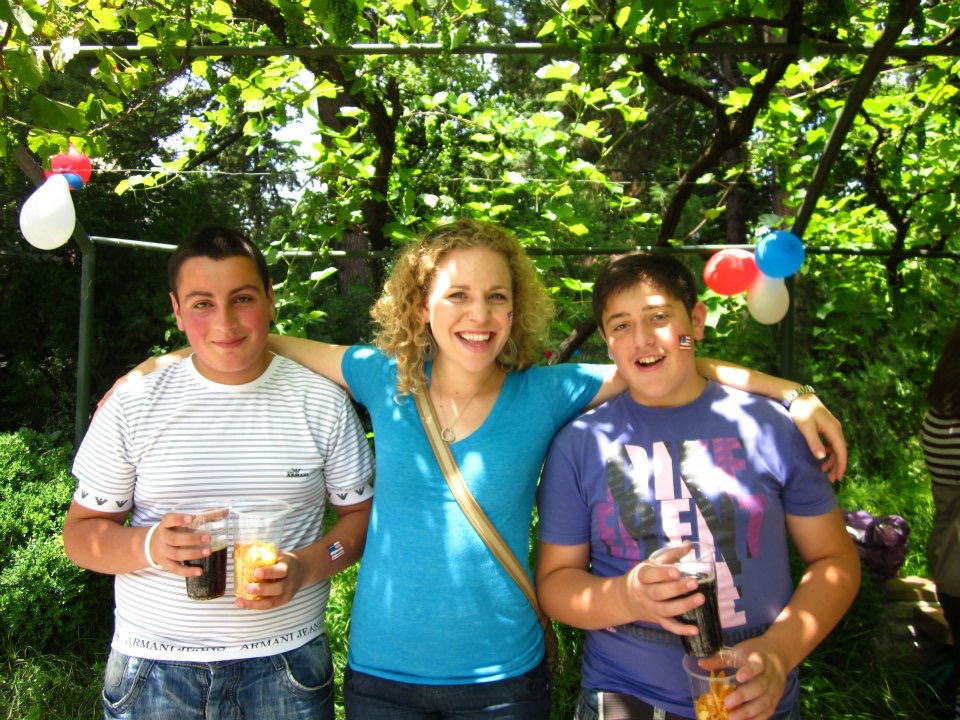
Learning by doing
As a volunteer, Ellermann designed and taught English lessons to students in 1st through 12th grades at a local public school for 18 to 20 hours a week. She also facilitated an after-school English language and American culture club sponsored by the U.S. Embassy, which included interactive games and crafts for elementary-, middle-, and high-school students. She admits that as a Peace Corps newcomer, “you think you’re going to work, but you’re really just learning how to do things all the time. Especially given the way I actually do things as a teacher now, I did very little teaching [back then]. I had no idea what I was doing. If I went back now, I could do such a better job!”
Like other Peace Corps alumni, Ellermann says that her work extended to developing and implementing community events. For example, she coordinated an English spelling competition for the Samtskhe–Javakheti region, and during the summer of 2013, she collaborated with fellow volunteers to plan, fundraise for, and host a series of camps for Georgian teenagers. “That’s one of the projects I’m most proud of because we taught life skills,” she says. Ranging from day and overnight to weeklong events, their curriculum included topics such as personal health and hygiene, nutrition, exercise, gender relations, and HIV/AIDS education. In addition to playing sports and having fun, Ellermann cherishes having developed friendships with the participants that continue even today.
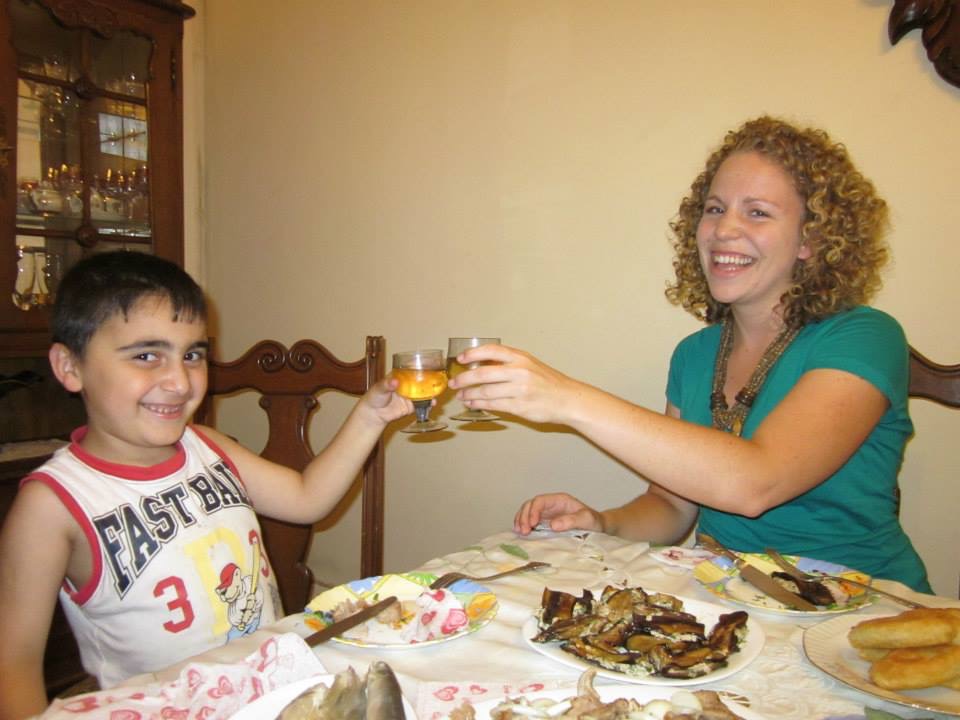
Her two-year stint in Georgia gave the alumna training in development as well. She served on a committee that reviewed and provided feedback on grant applications written by fellow volunteers and their community partners. She would then help decide which projects to fund. Those grants would go on to support educational and business projects such as beekeeping, resurfacing a gymnasium, and equipping classrooms with computers and projectors.
For Ellermann, dealing with failures was one of the greatest challenges of her Peace Corps experience—a reflection echoed by so many other volunteers. “You go in with this sense that you want to save the world and you’re going to bring all your knowledge and energy and idealistic views and share them with your people,” she shares. “And probably the whole first week of training, they were like, ‘Lower your expectations.’ … I didn’t make any systemic change in the country of Georgia, but I think I made impacts on individual lives.” In large part, she adds, the difficulty lies in the human resistance to change. After all, it is can be nearly impossible to influence or alter people’s mindsets, especially if those attitudes or customs are the product of broader worldviews, belief systems, or values that have evolved or even crystallized over thousands of years. And the Peace Corps’s mission is not to Americanize communities around the world; rather, it is, ultimately, an educational exchange of language, culture, and skills.
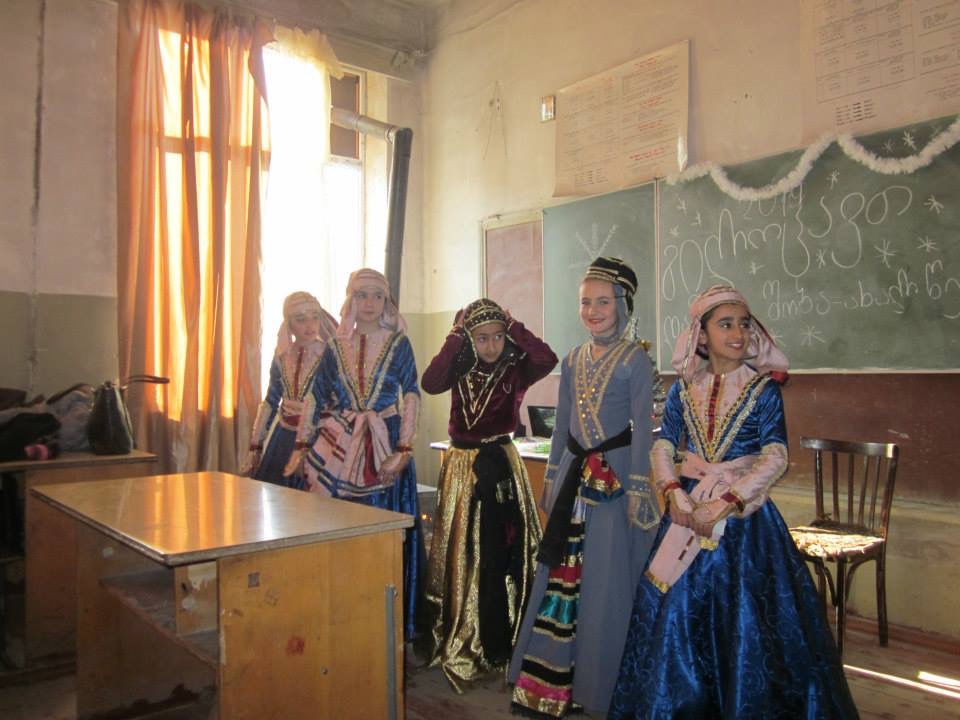
So it’s no surprise that the SU alum developed “a huge appreciation for Georgian culture and Georgian people.” She also deeply values the lifelong friendships that grew from collaborating with other volunteers. Those relationships arise from solidarity—from that common experience of having to rely on emotional maturity, persistence, and resilience to make it through the entire Peace Corps assignment. “You could not see or talk to them for 15 years, but if they showed up at your door, it would be like a day hadn’t passed,” says Ellermann. “We’re the only people who have experienced these things, and that’s been life changing for all of us.”
Still making an impact on individual lives
After completing her service in Georgia in 2014, Ellermann lived in China for a little over a year, again teaching English—this time for Disney English, a subsidiary of the Walt Disney Company. Another happy accident, the job came about after her cousin, who worked for Disney, forwarded her the announcement; she had had no previous aspirations to live or work in China, but, she says, it turned out to be “a great decision.” However, after having lived outside the U.S. for several years and working in positions that were temporary, the SU grad admits she was feeling burned out. Watching same-aged friends getting married, buying houses, and starting families didn’t help. So she returned to Texas, moving back in with her parents.
One day, Ellermann’s mother, also a teacher, learned that a teaching position at a local elementary school had opened up. It was a temporary position, so Ellermann applied—still without any specific plans for the long term. “I did that for a few months,” she remarks, “but then I thought, I kind of like this. Maybe I do want to do this!” So she pursued and earned her teaching certificate four years ago, and since then, she has worked as a math interventionist as well as a fourth-grade reading and social-studies teacher at Pittsburg Elementary School—just 12 miles south of her hometown of Mt. Pleasant.
“I enjoy teaching and being with the kids,” she comments. “I enjoy having the opportunity to have an impact on their lives.”
“I think that the mindset that students and the whole school community have definitely prepares you for that because you have a pretty rigorous course of study and [because] Southwestern is very civic-minded, and when you’re surrounded by people who feel that way, it makes it easier to do something like that.”
Ellermann’s academic and professional life may so far have comprised a series of accidental opportunities and serendipitous decisions, but she values her Peace Corps service for making her a better teacher. And she believes that Southwestern, in turn, provided a crucial foundation for that transformative experience. “I think that the mindset that students and the whole school community have definitely prepares you for that because you have a pretty rigorous course of study and [because] Southwestern is very civic-minded, and when you’re surrounded by people who feel that way, it makes it easier to do something like that,” she reflects. “Southwestern encourages you to pursue service and to really enjoy those kinds of things.”
















